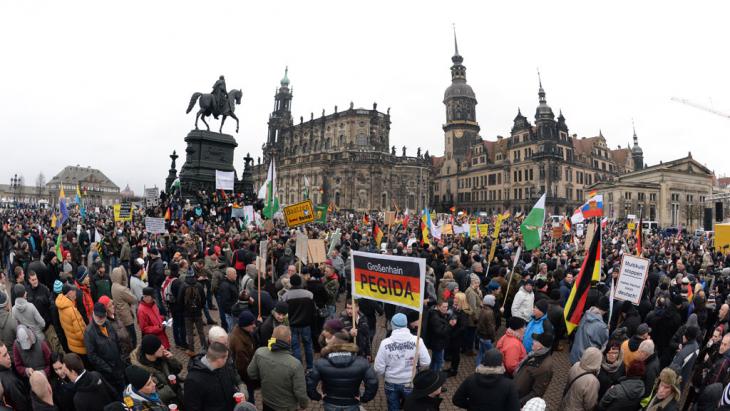Pegida may be running out of steam, but its ideas live on

The rejection of Pegida by a broad majority of the German public, as important and impressive as it may have been, should not detract from the fact that key elements of the ideology invoked by Pegida have penetrated deep into the social mainstream and have been propagated with startling success for many years by numerous thinkers, academics, writers, politicians and media.
To therefore dismiss this majority's general distancing of itself from Pegida as a sham would be going too far. But without an in-depth discussion of the ideologies, opinion formers and resentment that lie behind Pegida, this act of distancing remains superficial and cheap. It could look as if this majority's rejection of Pegida is concerned more with the external form of the protest than the motivating subject matter itself, issues that if packaged in a different way could most certainly reassume their place in politics and media – just as they have always done.
Common denominator
Pegida means "Patriotic Europeans against the Islamisation of the West". From the tangle of opinions and ideologemes that are characteristic of Pegida, one element sticks out as a common denominator. It is the part of the name Pegida that remains when the words "Patriotic Europeans" are taken out: "against the Islamisation of the West".
Talk (the myth, the fable) of the Islamisation of the West, which is either apparently imminent or already in progress, is the statement at the heart of a theory that has become an accepted element of the German and European spectrum of opinion, under the palliated term "criticism of Islam" – an element that enjoys such a high degree of acceptance that many who play their part in the dissemination of this theory are clearly unaware of its implications.
It would be worthwhile at this stage to briefly outline just how deeply this theory – or ideology – has penetrated the mainstream of civil society and how even those actors who consider themselves to be above the accusation of racism, are unconsciously taken in by it. For example, no one would think of making a link between the German Publishers and Booksellers Association and its annual Peace Prize with Pegida, racism and anti-Islamic inflammatory publications. But even this has in the meantime become possible, even though the association could not be directly held responsible for it.
In 2011, the year of the Arab revolutions, the Algerian author Boualem Sansal, who writes in French, received the Peace Prize of the German Book Trade. One could speculate over the reasons why this particular writer of modest significance was selected for Germany's most prestigious prize in this historic year, but that is not the issue here. Much more important is the fact that with this prize, the German Booksellers and Publishers Association inadvertently gave credibility to a writer who disseminates the slogans of anti-Islamic feeling without reflection.

Cementing resentment that is critical of Islam
The English translation of the German title of his last book to be published in 2013, is: "Allah's Fools. How Islamism is Conquering the World" (published in German translation by Merlin). Sansal, who as a Francophone Berber faced an immediate threat from Arab jihadis in the Algerian civil war, has solid personal reasons to bemoan developments in Islam and the violence perpetrated in the name of this religion, and to warn against it, and he has every right to do so. But the subtitle of the German translation of his book goes further than this and does something else: without any factual basis, it cements the resentment that is critical of Islam from which it has arisen. Posing this disconcerting question as to how Islamism is conquering the world suggests that Islamism is indeed in the middle of this conquest. Conquering the whole world? One could scoff that at least in the case of Pegida, they were only talking about the West.
It should be noted that the original French title: "Gouverner au nom d'Allah. Islamisation et soif de pouvoir dans le monde arabe" (Governing in the name of Allah. Islamisation and the thirst for power in the Arab world) is, despite the fact that the concept of Islamisation also crops up in the case of Pegida, more nuanced and – in the first part of the title too – rather more understated than the German version, because it applies Islamisation to the Arab world alone.
The general thrust of the original Sansal title, which is at best implied, is irresponsibly generalised by the German publisher and made compatible with the dogmas of Islam criticism by using the phrase "Islamisation of the world".
Evidently, neither the publisher nor the writer, who would certainly deny any affinity with Pegida, have a sense of the abuse committed with the subject of Islam.
Like so many who comment on the issue, we can assume that they do not intend to foment anti-Islam resentment, to disseminate xenophobic ideologemes and play into the hands of Pegida activists under the seal of approval of the German Publishers and Booksellers Association. But in this case, just as in many others, this lack of sensitivity marries up in a rather unpalatable way with speculation over the enhanced marketability of the more sensational title that hints at a criticism of Islam.
Criticism of Islam as a business

After all, criticism of Islam is a business. If I as a writer wanted to make money with the subject of Islam, then I would have to change sides immediately. And comparing the sales figures of serious books about Islam on the one hand, and of writings that are critical of Islam on the other, any informed person would be totally appalled.
And so it happens that the sober and perfectly reasonable statement concerning a process of "Islamisation in the Arab world", as it appears in the French subtitle to Sansal's essay, actually becomes a "conquering of the world" in the German translation.
Sansal and his German publisher are just one relatively harmless example of the barely acknowledged presence of Pegida-style phrases that are critical of Islam even in a public arena that sees itself as politically correct and culturally refined.
If you call up Sansal's book on Amazon and look at what the buyers of this book have otherwise shown an interest in, your screen will immediately (and unsurprisingly) be filled with a whole palette of the most offensive literature that criticises Islam.
If you look at the writers that crop up here, which publishers are publishing their books, which media offer them a forum, who is inviting, courting, and defending them and showering them with prizes, accolades and professorships; if you take a close look at the ideas that these people are propagating and compare them with the ideas that are central to the Pegida movement, then you will realise that Pegida is not a fringe phenomenon and that, even though Pegida is disappearing from the streets, the ideas that spawned the movement and with which we have long been familiar, will remain.
If resistance to Pegida is to be taken seriously and helped towards sustainability, the mask of putative respectability must be torn from the faces of the propagandists who criticise Islam. Approving of criticism of Islam but condemning the Pegida street protests is about as hypocritical as actually endorsing homosexuality, and even enthusiastically practising it, while at the same time distancing oneself from public displays in the form of a Christopher Street Day parade, and indeed expressing one's disgust at such things and declaring them to be a bridge too far.
What, if not Pegida, did Thilo Sarrazin, his many hundreds of thousands of enthusiastic readers, and the innumerable readers of all the other critics of Islam want? Those who, like the people who marched with Pegida, fell for the rhetoric of the Islam critics and believed they had taken to the streets with the backing of the silent majority might well now feel betrayed. For decades, people have been fed the story of Islam's world domination plans. Moreover, the entire political establishment tolerated the fact that a German president was hounded out of office, a president who did not sing along to this tune and actually – perish the thought! – refused to hold his tongue on the matter. And now, despite all this, we are now surprised that people take to the streets in anger when they see that although anti-Islamic sentiment is rife, it is not translated into any discernible policies.
So they took to the streets on winter evenings and those who gave them their ideas and put them up to it turned around and called them racists to their faces! If this is not perfidy, then what is? One could almost feel sorry for Pegida.
The dilemma of Islam criticism
Pegida's dilemma is nothing other than the dilemma of Islam criticism itself. One now has good reason to assume that there is no concrete political agenda whatsoever behind the Islam criticism movement. It is, just like Pegida itself, far too heterogeneous, consisting of right-wingers and left-wingers, with supporters in all German parties, uniting Marxists and neo-Nazis, old 68ers like Bazon Brock and young neo-liberals like Bernd Lucke, anti-Semites and pro-Israel activists, feminists and cigar smokers, homosexuals and homophobes, pro-Putinists and Transatlanticists, radical secularists and radical Christians and not least innumerable Muslims who feel a huge sense of – frequently understandable, but unfortunately often highly undifferentiated – anger at the culture of their origins.
All these contradictions, reflected every Monday in the Pegida demonstrations, mean that criticism of Islam is a movement that is impossibly and perfectly disguised, that never reveals itself in its entirety, that bears some guerrilla-like features, but that in the end, is apolitical.
The idiosyncratic split in Germany, evident from the rejection of Pegida on the one hand, and the omnipresent prejudices that are critical of Islam on the other, can probably also be explained by the fact that most people, despite slight unease, are ultimately reasonably content with the situation and politics in Germany and have no interest in any kind of political sea change, whether it be to the right or to the left.
Instead of politically converting this unease, it is channelled into fostering anti-Islamic resentment without any desire to immediately take to the streets on a rainy winter's evening because of it. The government appears to have everything under control at the moment. What's more, it goes without saying that no one wants to have anything to do with the neo-Nazis, who are also marching with Pegida.

Moving away from this ideological schizophrenia
If we want to move away from this schism in our consciousness and ideological schizophrenia – against Pegida, but not against criticism of Islam – then we must subject ourselves and our worldview to closer scrutiny than we have done thus far. It will not be enough to declare our anti-racist disposition through the simple rejection of Pegida, and allow things to take their course. After all, this is not about our salvation, but about the fact that the behaviour of the majority society towards minorities has directly practical consequences.
It is impossible to understand and prevent any future repeat of phenomena such as the massacre by Anders Breivik on 22 July 2011 in Norway, the Dresden courtroom murder of 1 July 2009, the burning of asylum seekers hostels and the NSU murders perpetrated over several years, without understanding that the perpetrators were not only indoctrinated by criticism of Islam, but that they assumed themselves to be, and were able to imagine with good, statistically verifiable reasons, that they were acting in the name of many, if not of a silent majority of the population.
Stefan Weidner
© Qantara.de 2015
Translated from the German by Nina Coon
